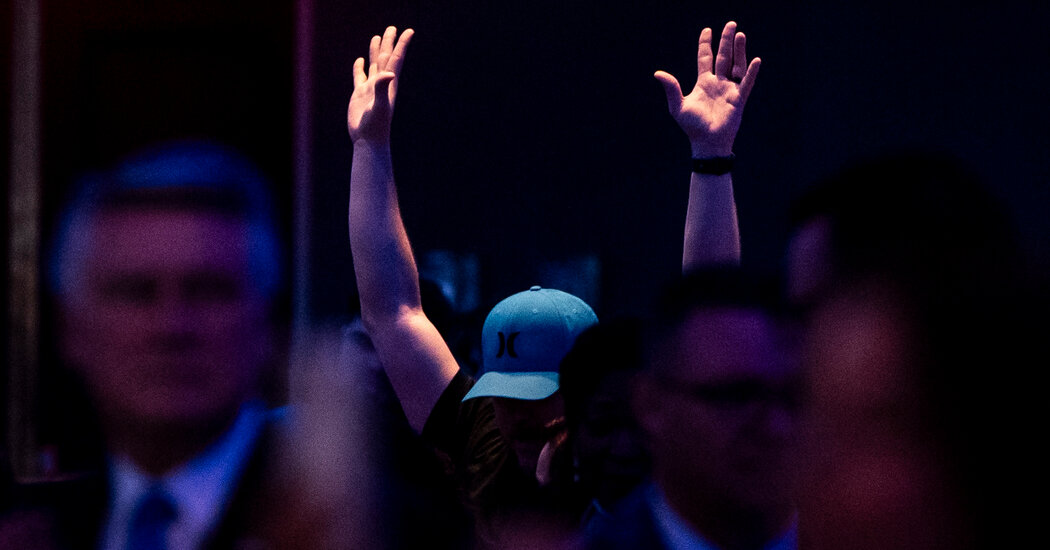To the Editor:
Re “Religion’s Role, Revisited,” by Lauren Jackson (Sunday Styles, April 20):
About a third of the way into this essay, I realized that the author was on the wrong track. Religion is not about the individual but about the community.
The Torah begins not with the creation of an individual but of an ecosystem within which individuals can thrive. And all major religions, in both scripture and practice, emphasize the importance of a common community.
Because the author focuses so intently on our national illness of narcissism, she misses the simple answer to her question: Religion is to be found in the people next door, the ones in need down the block and across the sea, the ones who need just laws and an end to violence. To be authentic, religion needs to be not about “me” but “us”; it needs to make us better neighbors, better lawmakers, better lovers and better at self-reflection.
Alexander M. Jacobs
Milwaukee
To the Editor:
I’ve long noted the unsettling contradiction between people who extol the community they find in their religious lives and their need to judge and stereotype those outside their community.
Lauren Jackson first lost me at “elite liberals,” a reductive term that dismisses humanity’s rich and complex experiences, beliefs, family influences, education and ethical framework. Further, as someone who has lived in or adjacent to large cities my entire life, I’m deeply skeptical of her claim that “many said they left religion because they moved to places like major cities, where people were more hostile to it.” This makes me wonder about the demographics of her self-selected survey respondents.
I, along with my family and friends, have always been able to access and participate in warm faith communities. The “hostility” I can think of has been in cases where Americans’ professed religious beliefs have impinged on other Americans’ rights, beliefs and welfare.
I have seen this intolerance in my country with increasing frequency: book banning, school vouchers for religious education and religious beliefs that have bled into the secular state, resulting in American women today dying from untreated miscarriages and American children dying from preventable diseases.
Finally, as the Jewish daughter of a refugee from Nazi Germany, I paused when I read that more than 50 percent of Americans believe that the United States should be a “Christian nation.” Somehow, I don’t believe that these Americans’ conception of a Christian nation would align with the values of Jesus, who implored his followers to care for the poor, the sick, the stranger and the imprisoned, and who said, “Judge not, that ye be not judged.”
Elisabeth Ochs
San Francisco
To the Editor:
It doesn’t make sense to compare people who go to church to people who go to yoga class. We should compare churchgoers to people who have a consistent daily spiritual practice, people who rely on time they spend on their own every day to profoundly nourish themselves and be with who they are beyond their minds and emotions.
Spirituality exists in the realm of mystery, the most intimate part of life. It’s where we discover meaning and the courage to take responsibility. It’s an inner reality we each need to explore for ourselves, or not. It’s not about having a god, but rather experiencing transcendence on a daily basis.
The author muses that maybe “it’s possible to be both believing and discerning.” While belief is most often tied to religion, which is organized around dogma, discernment is the purview of spiritual development. Consistent daily spiritual practice and discernment can take one beyond belief to direct experience.
Pamela Miles
New York
Stop the Elderspeak
To the Editor:
Re “Honey, Sweetie, Dearie: The Perils of Elderspeak,” by Paula Span (The New Old Age column, May 6):
This should not be news or necessary. Speaking down to adults, no matter how fondly or well intentioned, is disrespectful. In practice, it’s too often dismissive.
My 1988 book, “Uneasy Endings: Daily Life in an American Nursing Home,” called this practice out as infantilizing. Whether it’s pronouns or diminutives, it’s best to ask people how they would like to be addressed and honor those preferences.
The real question is why we have to be taught that old people are adults.
Renée Rose Shield
Seekonk, Mass.
The writer is a retired clinical professor at the Brown University School of Public Health.
To the Editor:
Your article about elderspeak resonated with me. As a man who will turn 80 in a few months, living independently with my wife, I hear the very same terms when I visit my doctors’ offices and see the nurses: “Sweetheart, my love, honey, lie on your tummy for me.” And worst of all: being called “young man.”
That term is not only untrue, but it’s also condescending at best. Call me sir, Mr. Kahn or even Mr. Bruce, but “young man” I am decidedly not!
Bruce Kahn
Atlanta


